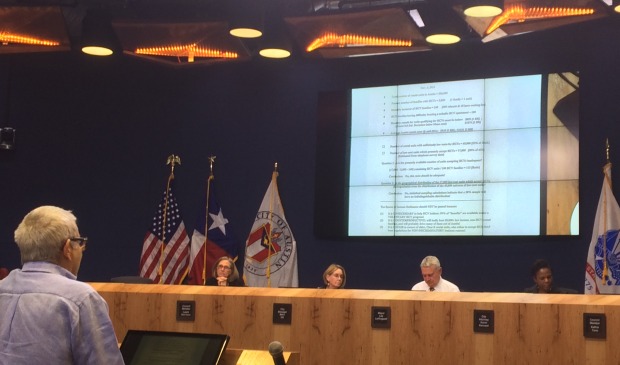City Council advances source of income ordinance
Friday, November 7, 2014 by
Tyler Whitson City Council members took another step toward prohibiting housing discrimination based on source of income Thursday, passing an ordinance on second reading that amends the city code.
The ordinance includes language that offers an exemption to property owners who do not directly or indirectly own more than four dwelling units and do not use a property manager.
Council Member Mike Martinez based the amendment on a letter that HousingWorks Austin’s Mandy DeMayo sent to Mayor Lee Leffingwell and Council. It replaced Council Member Bill Spelman’s previous amendment that exempted dwelling structures of less than five units.
Martinez told the Austin Monitor that he was unsatisfied with the previous ordinance. “It meant that the policy would only apply to apartment complexes,” he said. “We know that folks need access to housing.”
Martinez explained that his amendment was a compromise. “I don’t like it,” he said, “but I was willing to accept it to at least open the door so that we can clearly demonstrate to landlords who own homes that it’s not a burden, it’s not a hardship, it’s actually a good thing.”
Martinez added that, though the current version of the ordinance does not apply to all rental-housing units, “it hopefully will open up a significant number that can impact folks looking for affordable housing.”
Council Member Laura Morrison, who supported Spelman’s previous amendment, said she appreciated the recommendation to reconsider it. “Having been able to get a better idea of how significant that exemption was, I’m glad that we’re backing off on it a little bit,” she said.
Council made the decision after hearing arguments from public speakers for and against the ordinance. Many of them centered around the U.S. Department of Housing and Urban Development’s Housing Choice Voucher Program, also known as Section 8.
Those who spoke against the ordinance argued that it would impose an undue financial burden on property owners by forcing them to accept Section 8 vouchers and comply with the associated regulations.
John Joseph, an attorney representing the Austin Apartment Association, said that his client’s opposition is “not to Section 8 vouchers and Section 8 tenants, but rather the process and bureaucracy that it brings with it.”
Joseph asserted that the ordinance “most likely violates state law because it is not substantially equivalent to the federal fair housing law.”
Those who spoke in favor of the ordinance argued that it is extremely difficult to find suitable housing, especially for people with disabilities, because there are not enough property owners who voluntarily accept Section 8 vouchers. A few members of the disability advocacy group ADAPT of Texas made this assertion or attested to it with their own stories.
Brian McGivern, an attorney with the Texas Civil Rights Project, called source of income discrimination a form of segregation. He said that some of those opposed to the ordinance have reacted with “so much fervor, so much anger, all of which is nothing but speculation.” He asserted that, if the ordinance passes, they would view it differently after a year or so.
Mayor Pro Tem Sheryl Cole said she supported the ordinance as amended, but was concerned that the city does not have any particular department responsible for enforcing it.
John Babiak of the Human Resources Department’s Equal Employment and Fair Housing Office said that, if the ordinance does pass, his office “would have the authority to receive, investigate and attempt settlement of complaints on the basis of source of income.” He added that his office would work with the Law Department as it receives complaints.
Council agreed to consider a third reading of the ordinance at its Dec. 11 meeting, when they will also hear a proposal from staff about a voluntary “Good Landlord Program” that Council directed the city manager to develop in an Oct. 2 resolution.
Spelman, who sponsored the April 17 resolution that led to the ordinance prohibiting source of income discrimination, was absent Thursday because he was recovering from surgery. Cole asked Council to approve the ordinance only on second reading so that Spelman would have an opportunity to vote on the final reading.
You're a community leader
And we’re honored you look to us for serious, in-depth news. You know a strong community needs local and dedicated watchdog reporting. We’re here for you and that won’t change. Now will you take the powerful next step and support our nonprofit news organization?



